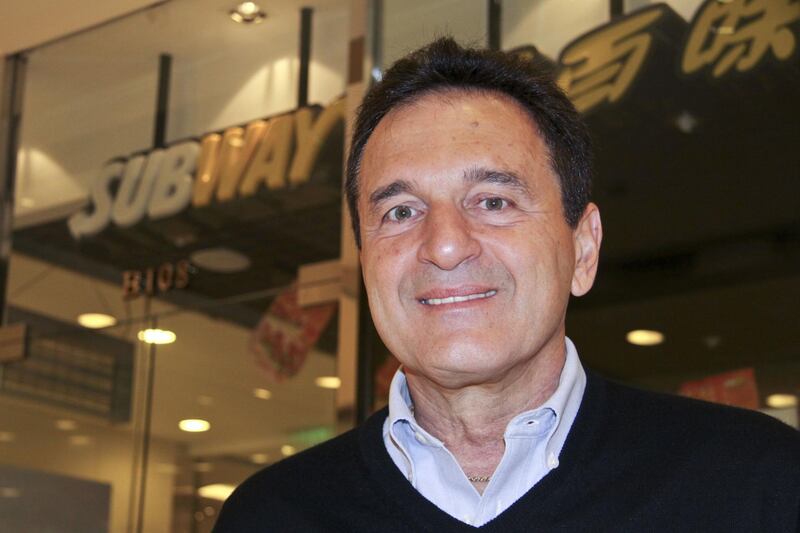Rishabh Java, 18, realised there was pent-up demand in the UAE for online classes taught by young instructors while delivering lessons to others during coronavirus-induced school closures. So he teamed up with friends Aadithyan Rajesh, 14, Neel Adwani, 19, and Khawaish Gulati, 18, to launch Tangled.ae, a new peer-to-peer learning website, in August last year.
The teenagers built the platform in 20 days and it now features 50 instructors and 1,000 users.
“We all were at home during the lockdown, had a lot of time and wanted to build something that was bigger than ourselves,” says Mr Java, who has also been involved with a neuroscience start-up called Aces for three years. “We are helping students build skills free of charge through Tangled.”
The founders recruit instructors, known as Untanglers, aged from 13 to 23 years through a three-stage process. First, they complete a form listing their achievements, then an interview and finally a demo class. Most Tangled learners are from the UAE and India, while instructors are from as far afield as the US, Canada and Australia.
The founders say that STEAM (science, technology, engineering, arts and mathematics) subjects are the most popular on the Tangled platform. However, it also offers courses on karate, dance, cooking and economics, among others.
Meanwhile, the learners, who must be aged between 7 and 21 years, are incentivised by using Tangled tokens.
“You start with 200 tokens. When you attend a class, you lose tokens but you can gain more by watching a video, for instance. Every post on the discussion forum gives you a Tangled XP token. This decides your rank on the leaderboard, which motivates the students and gamifies the learning experience,” says Mr Rajesh, who has also been working on a digital agency called Trinet Solutions for two years and will soon join Microsoft as a software engineering intern.
Mr Rajesh is the chief experience officer at Tangled, while Mr Adwani is chief technology officer and Ms Gulati is responsible for outreach and communication.
The platform is free of charge for both learners and instructors, so the Tangled founders use other means to fund operations.
“As teenagers, the one thing we don’t have is money,” says Mr Java, whose title is "chief Tangler".
“What we are doing to finance the project and keep it running before tapping sponsors is to participate in competitions, pitch our ideas and if we win, the entire prize money goes towards Tangled. We recently won Dh1,400 in prize money at a competition, which went into a virtual private server for a year.”
The four teens have collectively spent about $700 to date. Expenses include $400 for web hosting and cloud services, and about $100 to find a unique domain. While the co-founders did most of the development and back-end work on the website themselves, they also spent $100 on freelance work for the platform.
“Getting funded as a young start-up is challenging anywhere in the world. Right now, we are operating at a very small scale. Trying to make do with limited financial resources is a huge challenge,” Mr Java says.
The teen entrepreneurs are building a premium model of Tangled, where learners will have to pay a small monthly fee for extra features, such as attending class recordings that they have missed or have a one-on-one session with an instructor. In the future, they also plan to move to a YouTube-based revenue model, where approximately 60 per cent of the profit will be paid to the instructors. The founders are also working on an app for Tangled.
Although the teens say their driving force is hitting milestones, such as the number of registered users, they are often confronted with a lack of credibility when pitching their start-up to schools.
“People don’t think we are legitimate because we are offering free courses. It’s very difficult to get an opportunity for a face-to-face meeting with school principals and pitch our idea to them,” says Mr Java.
This problem also resonates with Rajvir Kohli, founder of another peer learning platform called StudySmart. The 18 year-old says schools are hesitant to promote such platforms because they think student-led initiatives lack credibility.
"My business is not something I am doing just for fun," he tells The National.
StudySmart is a free, student-developed platform that offers retrospective timetables, crash-course videos, tailored studying advice, self-produced revision guides, and other custom features for the GCSE, IB and A-level examinations. The platform began as a way of disseminating resources as a way of combating resource inequity between students in the UAE.
“While there are a lot of tutoring organisations in Dubai, there are not a lot of resources that teach students how to study, how to effectively revise or manage stress along with their regular exams,” says Mr Kohli. He launched StudySmart two years ago to address this market gap.

The teen has taken 12 to 13 students on board to work on content production and website development. The platform has so far garnered 180 learners organically.
The entrepreneur says raising finance is the toughest part for a student-led initiative. He pitched the business to the Silicon Fen Venture Fund, an ecosystem for young innovators, and was affiliated with them and received guidance on how to manage finances.
“As students, it is difficult to pitch to angel investors. We have gone through private means, by getting referred to people through friends and family,” says Mr Kohli, who also invests money earned from his tutoring endeavours into the business.
The start-up, which has been funded with $1,200 since launch, recently raised another $1,800 privately. The founder is planning to launch a few optional paid features, such as a question bank.
“Other challenges are our time constraints. The level of work we put in fluctuates based on our exams and other academic responsibilities. That holds back progress on the platform. Eventually, when we scale up, we will also have to start paying people, so we may need to restructure the organisation,” adds Mr Kohli.
The teenager says he will continue working on the start-up in university. “Universities abroad have a much bigger audience. They usually have incubators to help start-ups. There will be a lot more opportunity to grow.”
One of the few places where teen entrepreneurs can gain access to funds is through friends and family, says Jazeer Jamal, founder of GrowValley, a start-up studio building start-ups at scale, and co-founder of Kidstarter, an online marketplace where children can run their own business with minimal adult support. Once the business is launched, “there are multiple options to raise money from the likes of incubators, accelerators and VCs such as Hub71, 500Startups and Sheraa in the UAE”, he adds.
Mr Jamal also recommends that teens read The Art of Start-up Fundraising by Alejandro Cremades to learn about raising funds.

“Frugality is something that teen entrepreneurs need to learn. Most importantly, learn to spend less than what you can afford and put the maximum funds in developing the business,” he adds.
Schools and other educational institutions in the UAE offer entrepreneurship programmes that teach various skills such as writing business plans, pitching to investors, prototyping , marketing and hiring a team. However, most of these programmes do not teach the key skill of financial literacy, says Marilyn Pinto, founder of Kids Finance Initiative.
“A majority of young entrepreneurs will be bootstrapping their business and this is where their knowledge and habits of being careful spenders and budgeting efficiently will come into use,” says Ms Pinto. “They need to distinguish between and prioritise their needs over their wants. Lack of this basic awareness will lead them to burn through their funds at an alarming rate, thus paving the way for an entrepreneurial disaster.”
She also recommends that teen entrepreneurs understand how credit works, steer clear of costly debt and realise the importance of maintaining a good credit history.
“Many bank lenders look at personal credit histories before they agree to give entrepreneurs start-up loans. Having a poor credit score will scuttle their chances of getting those loans, even if they have the best business plan out there,” Ms Pinto adds.













